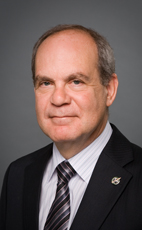Mr. Speaker, indeed, we have heard a lot of opinions on these two policies, and on a number of others as well. I am not here to say whether I agree or disagree, or the minister agrees or disagrees, with what he is saying. However, I am saying we need to be able to have a discussion on these issues. I am not alone in this position. In the words of the host of The Fisheries Broadcast in Newfoundland, John Furlong, it is time to have a discussion without fear of recrimination. I hope he agrees with that.
In fact, we have heard a broad spectrum of views and many people have impressed the importance of reviewing the origins of policies.
My colleague has defined the terms “owner-operator” and “fleet separation”. However, let me provide a bit more and perhaps a bit of history on it, as well.
The fleet separation policy was introduced in the Atlantic fishery in the 1970s. It states that corporations and processing companies may not be issued new fishing licences. Originally, the purpose was to separate the harvesting sector from the processing sector to help prevent any one group from controlling the supply chain.
The owner-operator policy was introduced in the 1980s to address an imbalance that actually emerged from the fleet separation policy. This policy requires licence holders to be on board the vessel to personally fish the licence. It was designed to support the individually operated inshore fleet, as my colleague has said.
These policies have evolved over time in response to specific requests. Many rules have been adopted over time to allow for exemptions. This has led to regional variances that complicate the administrative process and may create unfair advantages. For example, in Newfoundland and Labrador, a fisherman can get a 120-day exemption from the owner-operator policy, allowing someone else to operate his vessel. In the Maritimes region, the initial exemption only permits 30 days.
Another example is, in some cases, processors were providing capital to harvesters in order to secure a supply of fish. In some cases, trust agreements did indeed put control and decisions in the hands of the processors.
As a result, another policy was introduced in 2007 to preserve the independence of inshore harvesters and strengthen the owner-operator and fleet separation policies. Last year, the fleet separation policy was further amended to allow wholly owned corporations to hold fishing licences. There has been some evolution of these two policies.
Typically, with every rule and policy that has been adopted over time, exceptions or exemptions have had to be adopted to provide the flexibility that harvesters need to properly manage their business.
To be clear, our consultations were not focused solely on the owner-operator and fleet separation policies, though we recognize their importance to harvesters in the Atlantic.
These policies, and others, are complex, often with inconsistencies between fisheries and regions. They need to be considered in today's context to see if they remain effective in the face of fluctuating resources and changing market conditions.
We continue to believe that the fisheries can, and should, contribute more to the Canadian economy and generate more wealth for those who work in it. We are always looking for ways to give industry the tools it needs to operate in an environment that is more sustainable, stable, and economically prosperous.
The purpose of the work that we are doing in the consultations and continued review is not to arbitrarily remove policies, but to see where unnecessary complexities and inefficiencies exist and question barriers for improved economic prosperity for fishers.
It is for these reasons that the minister and his officials went out to speak with Canadians with an open mind to hear their views on what works and what does not. Now we are considering the feedback we have received through in-depth and objective analysis. This will allow us to better understand the issues and know the best way forward.

